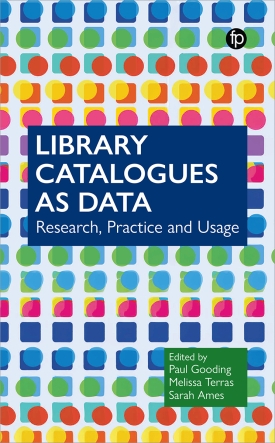
Primary tabs
You don't need to be an ALA Member to purchase from the ALA Store, but you'll be asked to create an online account/profile during checkout to proceed. This Web Account is for both Members and non-Members. Note that your ALA Member discount will be applied at the final step of the checkout process.
If you are Tax-Exempt, please verify that your account is currently set up as exempt before placing your order, as our new fulfillment center will need current documentation. Learn how to verify here.
- Description
- Table of Contents
- About the authors
This book will be an essential read for practitioners in the GLAM sector, particularly those dealing with collections and catalogue data, and LIS academics and students.
Through the web of library catalogs, library management systems, and arrays of digital resources, libraries have become repositories not only for physical and digital information resources but also for enormous amounts of data about the interactions between these resources and their users. Bringing together leading practitioners and academic voices, this book aims to consider library catalog data as a research resource. Separated into four sections, the book discusses a range of topics surrounding library information and data, including
- practical routes to preparing library catalog data for researchers;
- the ethics of library metadata privacy and reuse;
- data interoperability across library systems;
- data and collections bias;
- library-vendor relationships and data licensing;
- the practical and theoretical issues inherent in reimagining administrative, usage, and bibliographic data as a research resource; and
- scholarship that responds to the possibilities of library data.
Foreword - Thomas Padilla
Introduction: The Library Catalogue Data Ecosystem - Paul Gooding, Melissa Terras and Sarah Ames
Chapter 1: Making the Conceptual Concrete: Defining, Describing and Visualising Collective Collections - Brian Lavoie
Chapter 2: Effects of Open Science and the Digital Transformation on the Bibliographical Data Landscape - Péter Király, Tomasz Umerle, Vojtěch Malínek, Elzbieta Herden, Beata Koper, Giovanni Colavizza, Rindert Jagersma, Leo Lahti, David Lindemann, Jakub Maciej Łubocki, Alexandra Milanova, Róbert Péter, Nanette Rißler-Pipka, Dorota Siwecka, Matteo Romanello, Marcin Roszkowski, Mikko Tolonen and Ondřej Vimr
Chapter 3: Data Quality in Library Catalogues and its Impact on Access, Analysis, and Reuse - Gustavo Candela
Chapter 4: Data Bias and the Natural Language Processing of Metadata - Lucy Havens
Chapter 5: 'Contains Scenes of Mild Peril': Illuminating the Catalogues of Dark Archives - Martin Paul Eve
Chapter 6: Book Formats, Printing Practices and Reading Habits in Early Modern Europe - Mikko Tolonen
Chapter 7: '(S)hut not thy Heart, nor thy Library': Realising the Potential of Historical Library Borrowing Data - Katie Halsey and Matthew Sangster, with Brian Aitken, Karen Baston, Maxine Branagh-Miscampbell, Alex Deans, Jaqueline Kennard, Gerard McKeever and Joshua J. Smith
Chapter 8: ChatGPT for Bibliometrics: Potential Applications and Limitations - Daniel Torres-Salinas, Mike Thelwall and Wenceslao Arroyo-Machado
Chapter 9: Using Generative AI to Turn 19th Century Library Catalogues into Data: Applications and Limitations -Julia Bauder and Christopher Jones
Chapter 10: A Corpus Linguistic Analysis of Catalogue Data: Understanding Curatorial Practice Over Time - Rossitza Atanassova and James Baker
Paul Gooding
Paul Gooding is Senior Lecturer in Information Studies at the University of Glasgow. His research focuses on the impact of digital library collections on institutions and users. He was Principal Investigator on Digital Library Futures (2017-2019), an AHRC-funded project to analyze the impact of Non-Print Legal Deposit on UK academic libraries. Paul holds an MA in Library and Information Studies (2007) and a PhD in Digital Humanities (2014) from University College London. From 2014 to 2018 he was Research Fellow in Digital Humanities at the University of East Anglia, where he founded and led the UEA Digital Humanities incubator, and before undertaking his PhD worked as a librarian for BBC Sport.
Melissa Terras
Melissa Terras is the Professor of Digital Cultural Heritage at the University of Edinburgh‘s College of Arts, Humanities, and Social Sciences. With a background in Classical Art History, English Literature, and Computing Science, her doctorate (Engineering, University of Oxford) examined how to use advanced information engineering technologies to interpret and read Roman texts. Publications include Image to Interpretation: Intelligent Systems to Aid Historians in the Reading of the Vindolanda Texts (2006, Oxford University Press) and Digital Images for the Information Professional (2008, Ashgate) and she has co-edited various volumes such as Digital Humanities in Practice (Facet 2012) and Defining Digital Humanities: A Reader (Ashgate 2013). She is currently serving on the Board of Curators of the University of Oxford Libraries, and the Board of the National Library of Scotland, and is a Fellow of the Chartered Institute of Library and Information Professionals and Fellow of the British Computer Society. Her research focuses on the use of computational techniques to enable research in the arts and humanities that would otherwise be impossible. You can generally find her on twitter at @melissaterras.
Sarah Ames
Dr. Sarah Ames is Digital Scholarship Librarian at the National Library of Scotland, with responsibility for the Library's Digital Scholarship Service and Data Foundry. She is a member of the LIBER DH Working Group core group, where she co-chairs the Research Collaborations group, RLUK Digital Scholarship Network, and the Alan Turing Institute Humanities and Data Science group. Sarah has a PhD in English Literature from the University of Edinburgh; her PhD thesis was shortlisted for the Saltire Literary Awards 2013. Alongside this, she has postgraduate qualifications in Library and Information Science and in Data Science.


